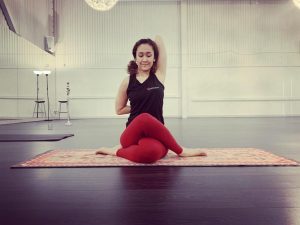Wondering Thoughts and How I Managed Them Through Yoga
- March 8, 2024
- Posted by: admin
- Category: Articles by Practitioners,

By Adelena Gustafsson
Have you ever felt like you had done something but can’t remember if you had actually done it? It’s like you were running on autopilot. I used to feel like this all the time, but now I can do things on autopilot while still remaining completely aware. If I’m tired, my mind has to work a little harder to focus, but I can still get there more easily. Sometimes the mind can play tricks on you, making you think you’ve done something, but you’re not sure because you physically can’t remember it. This used to frustrate me, like leaving the house and thinking you left the stove on, but in reality, you did turn it off because it’s a natural reaction after cooking, unless you were distracted and forgot. That’s a different story.
Sometimes the mind can also create an illusion that affects our feelings and can lead us away from what is real and what is not. I used to worry about how people thought about me and even worry about how I affected their lives. This took a lot of energy, and the illusion of what other people thought and felt used to keep me awake at night, when in reality, they had no idea this was happening. I used to spend hours, sometimes days, worrying about it.
Regular yoga, meditation, and pranayama practice have been proven to be a wonderful tool to keep the mind at ease and the body stronger. Since I’ve started regular meditation practice, even for as short as 5-10 minutes a day, I find myself more in tune with my surroundings, my feelings, and my mind. I can quickly let go of things that don’t serve me anymore. I can go through the emotions, filter, accept, and let go. Practicing the physical side of it has kept me in tune and aware of my body and how it works. Whenever I find myself unable to focus, I turn back to my breathing. In Patanjali’s Yoga Sutras, the Sanskrit aphorism “Yogas citta vritti nirodha” translates to “Yoga is the stilling of the fluctuations of the mind.” This is why yoga is the best way to keep the mind focused and at ease while making us more intelligent and emotionally resilient.
A review was published in the journal Brain Plasticity about 11 studies conducted on individuals who began to practice yoga regularly, with no prior background in yoga, alongside those who did not practice at all. The studies spanned a duration of 10-24 weeks, with a focus on Hatha yoga, encompassing meditation, physical practice, and breathing. Brain-imaging techniques were employed to observe the brain’s development. “From these 11 studies, we identified certain brain regions that consistently emerged, and they are surprisingly not significantly different from what we observe in exercise research,” stated Neha Gothe, a professor of kinesiology and community health at the University of Illinois, who led the research in collaboration with Jessica Damoiseaux, a psychology professor at Wayne State University (1).
Some of my favourite go-to practices are from the Pawanmuktasana series. I find that wrist rotations and eye exercises help me the most in finding focus, balance, clearing the mind, and working to set a vision. Concentrating on a very small and specific part of the body demands a lot of focus, and with practice, it helps eliminate distractions. Asanas that require balance are also a good practice for enhancing focus while simultaneously strengthening specific parts of the body, if not all body parts.
Utthita hasta padangusthasana (raised hand to big toe pose) is a wonderful standing asana for improving concentration while coordinating muscular and nervous balance. I’ve noticed that when I’m a little stressed, it can be challenging to find balance, but it also helps me assess the issue, regain focus, let go, and try again. If I still encounter difficulty, I move on to the next asana to avoid losing focus during practice and attempt it again later, as forcing yourself into an asana can also cause the mind to wander.
 Gomukhasana (cow’s face pose) is an excellent seated asana that induces relaxation. When practiced for more than 10 minutes, it can help alleviate tiredness, tension, and anxiety. It is also effective in relieving backache, which, in my case, can impact my ability to concentrate.
Gomukhasana (cow’s face pose) is an excellent seated asana that induces relaxation. When practiced for more than 10 minutes, it can help alleviate tiredness, tension, and anxiety. It is also effective in relieving backache, which, in my case, can impact my ability to concentrate.
Yoga Nidra or Shavasana is the best of all practices as it induces complete mental, emotional, and physical relaxation by turning inwards, and consciousness is separated from all external awareness and sleep. I find that when I have a lot on my mind and am unable to focus on just one thing or relax, Yoga Nidra helps slow down my mind, allowing me to see plans or set goals clearly. The state of awareness intensifies during the practice of Yoga Nidra or Shavasana, aiding the body’s recovery.
Pranayama is a wonderful way to conclude a practice, and my most favourite is Bhramari pranayama (the humming bee breath). Just as the name suggests, humming it essentially sends vibrations throughout the entire body, and when practiced correctly, it has an amazing calming effect on the mind. It is one of the best breathing exercises for freeing the mind from anxiety, frustration, and agitation. I have found that it significantly reduces anger. A study published in the International Journal of Physical Education, titled “The Effect of Bhramari Pranayama on the State of Anxiety in Sedentary Males from Gwalior,” found that regular practice of Bhramari pranayama had notable results in reducing anxiety.
Sometimes, our minds wander, and it’s hard to focus or distinguish reality from illusion. This can lead to stress, affecting us both emotionally and physically. So, it’s always helpful to return to a simple practice of awareness or physical exercise to regain our focus and continue with our daily routine. “The fact that yoga helps manage stress may also explain some of its other cognitive benefits — for example, stress is known to shrink the hippocampus, so anything that reduces stress likely counteracts that shrinkage as well” (3). When in doubt, I always return to my yoga mat.
References:
- https://www.sciencedaily.com/releases/2019/12/191212105851.htm
- http://www.researchjournal.co.in/upload/assignments/9_18-20.pdf
- https://www.inc.com/minda-zetlin/yoga-brain-benefits-memory-decision-making-emotional-intelligence.html?cid=sf01002
